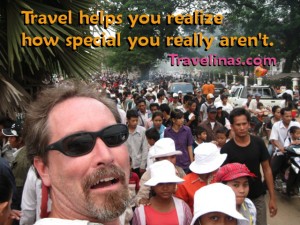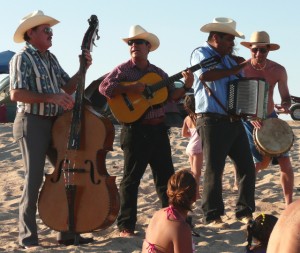 How do you feel when you get back from traveling? Tired? Relieved? Stunned? Happy? Depressed?
How do you feel when you get back from traveling? Tired? Relieved? Stunned? Happy? Depressed?
How about “connected?”
Yesterday, Julie pointed me to an excellent, short documentary on “the overview effect” and it made me think about one of the benefits of traveling: Feeling connected to humanity.
The overview effect is a concept first coined by writer Frank White in the eighties that describes a shift in awareness astronauts often experienced after spending time in space. Basically they left the planet, looked back at it, and saw a fragile oasis of life hanging alone in space. No borders. No conflicts. Every form of life ever known by humans was down there, barely protected from certain death by a thin layer of atmosphere.
When the astronauts returned to Earth, they had changed. They realized that the future of humans — and life as we know it — depends on us becoming a planetary society with a common drive to protect spaceship Earth.
I remember coming to this same epiphany in the eighties while looking at photos of the Earth from space. And that has impacted how I view the world ever since. It’s shaped my views on politics, illegal immigration, environmentalism, space exploration and travel.
In fact, when I travel is when it really hits home how connected we all are as a species. Travel illuminates for me the things we humans all share: The need for security and food and companionship and love. Our reactions when we are shy or curious or frightened. How we all daydream and grieve and despair and hope.
Sure, I’m often baffled (and sometimes annoyed) by the way other humans do things. I don’t relate to cultural idiosyncrasies like Vietnamese motor bikers who beep their horns furiously because they want me to step aside while they drive down the sidewalk. Or New Yorkers who refuse to smile or make eye contact, even though they’re packed shoulder-to-shoulder with other humans on a Manhattan street corner.
I feel this connectedness when I witness common human behavior in strange places. In Cambodia, we watched two small children offering alms to a Buddhist monk and we related to their parents and their pride at seeing their offspring become part of the world.
In the Bahamas, we heard about an old woman who had been a beautiful shark hunter and sailor in her youth. We tracked her down because she sounded so interesting, but when we arrived at her home we felt like intruders. But she smiled, invited us in and told us how nice it was to have visitors because it had been pretty lonely lately. She was more interested in us, than talking about herself. When she passed away a year or so later, we felt like we had lost a grandmother.

We make it a point to meet locals and get to know people while we are traveling. This may be a twenty-something backpacker from Australia or a couple of townsfolk in a Louisiana tavern.
Along the way, we gather emails and names for Facebook. We send photos. We don’t stay connected with these individuals. Life continues and time marches on. But we did connect and we never really forget these encounters.
When I return from a trip, I am relieved to be home and sad that the experience is over. But most of all I feel like I’ve spread more of me around, and have brought others home with me. Connected.
When you have groups of humans living in isolation from other humans, trouble starts to brew. You get bigotry and racism and conflict. One group pissed off at the other because they are different or want something the others have. Us against them. Borders and countries and nationalism arise. And people forget that we are all stuck on this rock rotating in the infinity of space.
Those who are afflicted with the overview effect can never go back to an isolated way of viewing humanity. I don’t know what it will take to achieve their goal of a unified mission to protect ourselves and earth. It’s too idealistic to think that travel is the glue for our fractured species, but it is certainly something that can help bond. And of course the Internet, social media and technology in general are connecting humanity at an exponential rate. We’ve got a long way to go, though, and we may kill ourselves first.
But travel allows you to engage personally and physically. You cannot hide behind a screen. You are forced to see how the actions of your country — damming a river, burning coal, starting a war — can impact others who live hundreds or thousands of miles away. And most of all, you will return a changed person perhaps ready to make a change.
